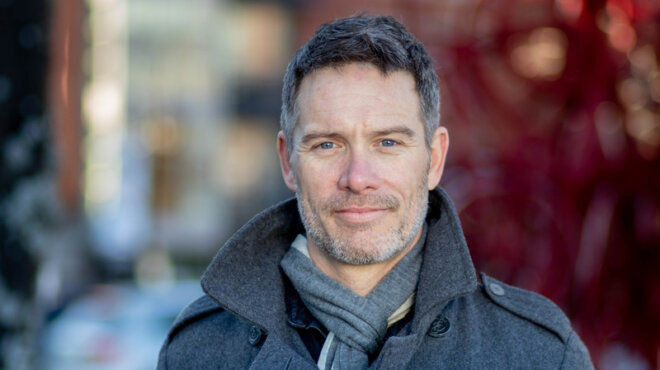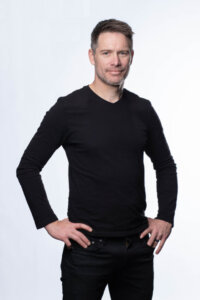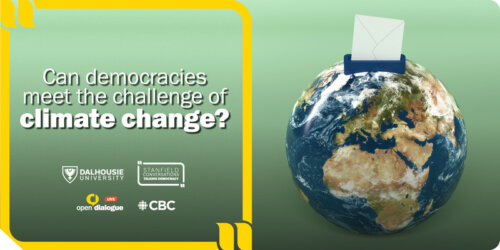
CBC Radio host and alum Jeff Douglas returns to Dal to moderate 2023 Stanfield Conversation
Douglas will lean into his talent of ‘going where the guest leads’ as moderator of this year’s lecture focused on democracies and climate change
By Emily MacKinnon
From a Dal psychology degree to being Joe in the iconic “I. AM. CANADIAN!” beer commercial to moderating this year’s Stanfield Conversation, Jeff Douglas (BSc’93) is no stranger to variety. He is up for just about anything and approaches each new task with an enthusiasm that he says blossoms from a bedrock of scientific thinking.
A scientific foundation
Although his career path took a distinctly creative bend, Douglas originally attended Dal for his Bachelor of Science. There, he learned about designing experiments and challenging preconceived notions.
“Up to that point there was kind of binary in my mind of success or failure,” says Douglas. “What I learned at Dal was, if your hypothesis is not confirmed, then you design another experiment.”
It’s an interesting notion to take into a career in journalism. Douglas credits his old History of Psychology professor, Jim Clark, with teaching him how to read critically and listen meaningfully; two skills vital for someone who converses for a living. “His whole thing was, be critical of everything — even things you ascribe to,” says Douglas. “Just because someone agrees with you, doesn’t mean you should dismiss every other argument and assume yours is right.”
Interviewing live on air
 While completing his science degree, Douglas decided to act on his love for theatre and performing. He landed a series of acting roles (perhaps most recognizable: the ever-popular “I. AM. CANADIAN!” rant for Molson). Those roles led to a career hosting and interviewing on CBC Radio, first on the national “call-out” show As It Happens, and currently as host of mainland Nova Scotia’s afternoon news and entertainment show Mainstreet.
While completing his science degree, Douglas decided to act on his love for theatre and performing. He landed a series of acting roles (perhaps most recognizable: the ever-popular “I. AM. CANADIAN!” rant for Molson). Those roles led to a career hosting and interviewing on CBC Radio, first on the national “call-out” show As It Happens, and currently as host of mainland Nova Scotia’s afternoon news and entertainment show Mainstreet.
And Douglas applies what he learned at Dal to his hosting gigs. Live on air, Douglas’s signature interview style is warm and charismatic. He connects with his guests on a personal level and teases out lines of conversation that don’t always follow the script his producers lay out for him.
“I go where the guest leads,” Douglas says with a shrug, as if it’s something he can’t quite explain. “When I ask a question and I see their eyebrows go up, I go, ‘OK, that’s the story they want to tell,’ and I follow them.”
That cozy, kitchen-table–style conversation applies to all of Douglas’s interviews, whether the story is jokey or serious. He is a staunch optimist and gives every guest the benefit of his doubt. “We are instructed constantly, as journalists, to ‘ask tough questions,’ ” says Douglas. “And a lot of times people assume that means, ‘ask questions in a tough manner,’ when that’s not necessarily the same thing.”
Asking tough questions
Threading the needle of asking tough questions in a conversational way will be Douglas’s challenge as the moderator of this year’s Stanfield Conversation on Tuesday, Oct. 24 at 7 p.m. The conversation “Can Democracies Meet the Challenge of Climate Change” will feature speakers Megan Leslie (LLB’04), Mark Jaccard (Simon Fraser University) and Naheed Nenshi (former mayor of Calgary).
 Guests must register to either attend in-person (seating is limited) at the Joseph Strug Concert Hall in the Dalhousie Arts Centre or participate virtually via live stream. American Sign Language interpretation will be provided on stage and on the live stream.
Guests must register to either attend in-person (seating is limited) at the Joseph Strug Concert Hall in the Dalhousie Arts Centre or participate virtually via live stream. American Sign Language interpretation will be provided on stage and on the live stream.
Dalhousie University’s Stanfield Conversations: Talking Democracy series builds on the legacy of Rt. Hon. Robert L. Stanfield, former Premier of Nova Scotia and former leader of the federal Progressive Conservative Party, who was known for his integrity, intelligence and openness to other’s opinions. The aim is to tackle subjects of national and international importance.
In this, the third iteration of the annual lecture, the conversation will focus on whether democracies can meet the challenge of climate change, and the imaginative and inspiring responses to that quandary.
“It will be interesting to talk to [Leslie, Nenshi and Jaccard] about whether robust and meaningful action can be taken if we wait for democracy,” says Douglas. “We just came through a pandemic and there was robust and decisive action taken without a whole lot of consultation.” But he acknowledges the starting point on climate is far more divided.
‘Disagree with the view, but respect the mind’
Douglas admits he’s slightly nervous about moderating such a weighty event but knows his scientific training will come in handy once again. “Our part is to model what a debate looks like among equals who have respect for each other, despite their stances on things. And I think that comes back to [former Dal prof] Jim Clark: you can disagree with the view, but respect the mind that arrived at it. That will be my challenge to the panelists.”
More than any nervousness, Douglas says he feels privileged to engage in discourse with this level of intellect and is excited for the stimulation it will offer himself and the attendees. “The speed with which people can take a question they’ve never heard and then have an answer that is full of information, stats and support for their argument,” he says. “It’s like seeing a great athlete compete.”
Headphones, not the microphone
In the end, moderating a good conversation comes down to active listening. Douglas, whose arms are decorated with tattoos, points to one on his left forearm — his first. “Headphones, not the microphone,” he explains. “Because the job is mostly listening, even though I do a lot of talking. They go hand in hand, but there’s no talking without the listening.”
Learn more about this year’s Conversation and how to register.